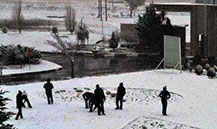 |
Qwaqwa Campus
7 August 2012 |
Kovsies have been treated to the rather unusual sight of snow Tuesday, with the Qwaqwa Campus covered in a blanket of snow and the Bloemfontein Campus also dusted in white.
Snowflakes on the Bloemfontein Campus had people clicking away on their cameras and cellphones to capture this rare picture. The last time the City of Roses experienced this much snow was about six years ago.
Prof. Sue Walker, Head of Agricultural Meteorology in our Department of Soil, Crop & Climate Sciences, says the snowy weather over the Free State was caused by a cut-off low pressure system in association with a strong anticyclone ridging in behind the cold front.
“This draws a pool of very cold air, in the upper air, from the far southern ocean area in Antarctica driven by a strong southerly wind. This caused the freezing level, which is normally high in the atmosphere, to be lowered to the ground surface level, resulting in the snow.”
Prof. Walker says a little snow is forecast for Wednesday although rain can be expected before it clears and becomes sunny for the long weekend.